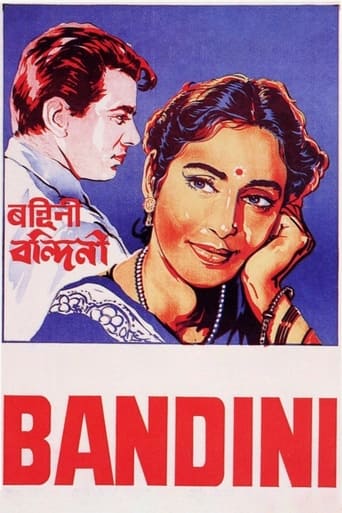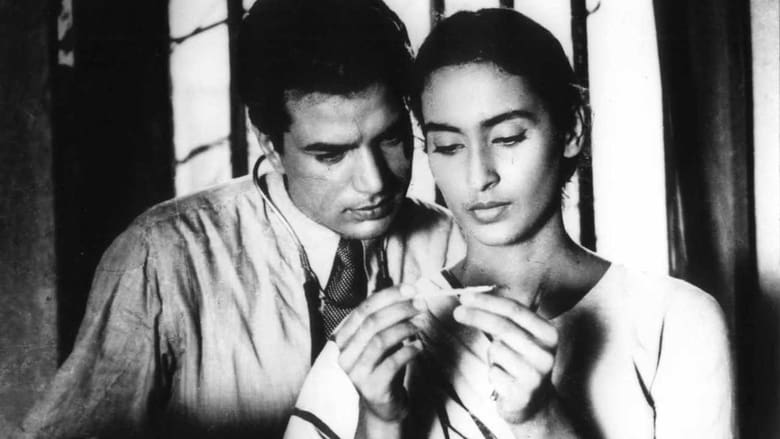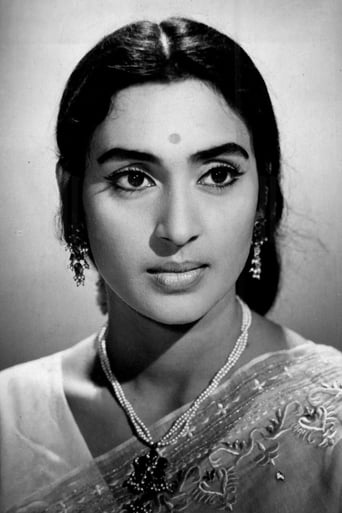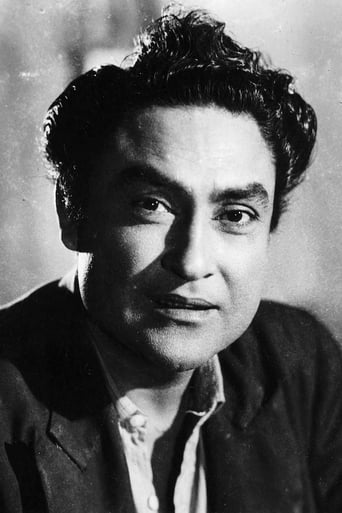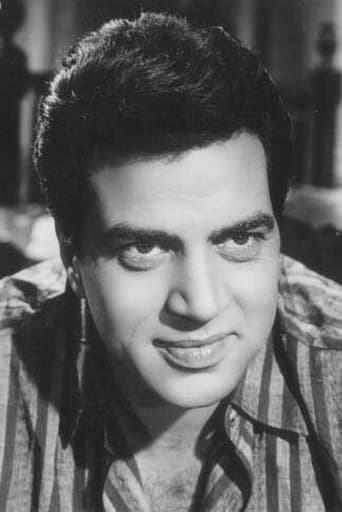Bandini (1963)
During the British Raj of the 1930s, a prison-doctor falls in love with a convict who eventually reveals the story of her past and her connection to a freedom fighter.
Watch Trailer
Free Trial Channels
Cast


Reviews
n my opinion it was a great movie with some interesting elements, even though having some plot holes and the ending probably was just too messy and crammed together, but still fun to watch and not your casual movie that is similar to all other ones.
Good films always raise compelling questions, whether the format is fiction or documentary fact.
The movie turns out to be a little better than the average. Starting from a romantic formula often seen in the cinema, it ends in the most predictable (and somewhat bland) way.
The movie's not perfect, but it sticks the landing of its message. It was engaging - thrilling at times - and I personally thought it was a great time.
I finally got the DVD of Bimal Roy's classic masterpiece 'Bandini'. 'Bandini' revolves around Kalyani, played beautifully by the one and only Nutan. We see most of the movie through Kalyani's point of view. During a time when women's rights were much more limited (compared to today), Roy tells us a woman-oriented story, part of which is set during the British Raj.Kalyani is a strong-willed, vivacious, educated, caring and happy-going young lady who lives with her father and cousin in a small village. She then meets a much older Bikash, who's a freedom fighter and is intrigued by his ideals. They gradually fall in love but as fate would have it, Bikash has to leave and he promises to return and marry Kalyani. Time rushes through as Kalyani and her father wait to hear from Bikash. Soon Kalyani hears that Bikash has already married and settled down with someone else. Kalyani is devastated but she has to be strong and prevent her father from finding out. The villagers raise questions and harass Kalyani's father. Kalyani, not being able to bear her father's humiliation, leaves for the city and manages to find a job. Yet, she commits the most unexpected deed and ends up in prison.The movie is at it's simplest form of film-making. It could have been high on melodrama but hardly anything about it is exaggerated. Even the background sound especially in the scene where we hear the banging iron (when Kalyani is about to commit the crime) is used very effectively. Songs are beautiful and flow with the narration instead of hindering it.Dharmendra gives a charming performance in a brief role while Ashok Kumar brilliantly plays Bikash but Bandini clearly belongs to Nutan. Her facial expressions (especially her eyes) reminds us what true acting really is (such expressions are hardly seen in movies of today) especially in the climax where she has to make a choice, her expressions are unforgettable. She portrays her character's inner conflict (the guilt and rejection of her second chance in life, the belief that she deserves the worst of punishment, the temptation she feels to live a life with Deven) and complex emotions with near perfection (if not perfection) and is flawless in terms of acting.Thanks to Bimal Roy for telling us a beautiful story about a strong minded brave young lady, in a time when hardly much attention was given to women.
Directed and produced by Bimal Roy, the genius who brought out such masterpieces as Do bigha zameen and Devdas, Bandini explores the human conflicts of love and hate intertwined in the mind of Kalyani (Nutan). The movie tells the story of Kalyani, the all suffering, selfless, sacrificing, and strong yet week Indian woman. She must make a choice between two very different men.A female role centric movie, Bandini revolves around Kalyani or Bandini (meaning imprisoned). How could she commit a crime? We learn the circumstances in flashback. Kalyani falls in love with a freedom fighter/anarchist - Bikash (Ashok Kumar) during the British Raj, who latter leaves her in the village promising to come back but never does. The society treats them the best way it could in the situation, the family is the butt of mockery. Broken by her father's misery and that of her own, Kalyani moves to the city, to the singing of the "O jaanewale ho sake to laut ke aana". In the city she works as a caretaker of an almost insane woman, who is also the wife of Bikash. When Kalyani is told her father came to the city looking for her and died in an accident she decides to poison her lover's wife, identifying her as the cause of her miseries. Bimalda captures her emotions with light and darkness falling on her face due to a welder's torch and the thumping of Iron in the background.In the jail Deven (Dharmandra) the jail doctor falls in love with her. Kalyani is not ready for it and starts to stay away from him. They are always shown with a partition in between after Deven proposes her. Another symbolism used in the movie is the occasional shouting of "All is well" by the prison guard when nothing in the movie is. The lines "Main Bandini Hoon Piya ki, Main Sangini Hoon Saajan ki" in the end score of the movie tells us that Kalyani is imprisoned by her love. "Mere saajan hain us paar" is sung by the musician S D Burman himself. The climactic song, it beautifully expresses Kalyani's dilemma of having to choose between Bikash & Deven. Though the movie features excellent songs they all depict the situation like nothing else could. This should not be looked upon as the traditional dance and sing Indian style of cinema. Without wanting to add more spoilers in my comments I will give some little details.The character of Kalyani gets lifted from that of a woman who is a prisoner of destiny to one who defines her own freedomNutan is considered the finest actor in Indian Cinema. Nutan is strongly supported by Ashok Kumar, whose flawless performance matches Nutan scene for scene and Dharmendra, just beginning to make an impact in the film industry. Bimal Roy is another one of the best. He won eight filmfare awards in his career the last one for Bandini and the first one for "Do Bigha Zameen" (which incedently was the first filmfair award). S D Burman is another one of the best. The songs are sung by Mukesh, Lata Mangeshkar, Asha bhosle, Manna Dey and S D Burman again all of them are either the best or one of the best singers. Bandini is brilliantly photographed by Kamal Bose with its rich tonal quality and evocative framing.
A really fantastic film, one of the most emotional I have seen without falling into sentimentalism or being weepy. So many memorable scenes, but the song by Asha filmed on Nutan's prison mate must be one of the most touching, proves songs Are a part of a movie that add to it, when well done. Nutan is just excellent, Ashok Kumar is his usual believable self, and Dharmender does what he is supposed to, young, handsome upright man. Nothing superfluous about this movie, a must see.
A perfect commercial film made in the 'art film' genre. One of Bimal Roy's best films. Cinematography by Kamal Bose is superb. And performance by Nutan in the role of Kalyani is one of the best ever performances by any heroine on the Indian screen. Musical score by S. D. Burman is unforgettable and shall always remain so. Two songs by Asha Bhosle viz., "Ab ke baras bhej, Bhaiya ko Babul" and "O' panchhi pyare, sanjh sakale" are among her best. Again both the songs sung by Lata Mangeshkar, viz., 'Mera gora ang laile, mohe shaam rang daide' and 'Jogi jab se too aya mere dware" are again superb. And a song each by Mukesh (O' jaane wale ho sake to laut ke aana), and Burman dada himself (O' re maanjhi) are again among their best ever. Manna Dey's (Mat ro Maata), a patriotic song, is also a soul stirring number.In short, a classic of Indian Cinema.

